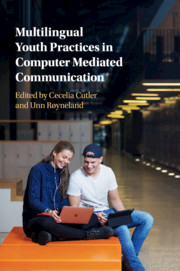
-
Select format
-
- Publisher:
- Cambridge University Press
- Publication date:
- 31 August 2018
- 20 September 2018
- ISBN:
- 9781316135570
- 9781107091733
- 9781107464544
- Dimensions:
- (228 x 152 mm)
- Weight & Pages:
- 0.51kg, 272 Pages
- Dimensions:
- (229 x 152 mm)
- Weight & Pages:
- 0.409kg, 274 Pages
You may already have access via personal or institutional login
Book description
With an eye to the playful, reflexive, self-conscious ways in which global youth engage with each other online, this volume analyzes user-generated data from these interactions to show how communication technologies and multilingual resources are deployed to project local as well as trans-local orientations. With examples from a range of multilingual settings, each author explores how youth exploit the creative, heteroglossic potential of their linguistic repertoires, from rudimentary attempts to engage with others in a second language to hybrid multilingual practices. Often, their linguistic, orthographic, and stylistic choices challenge linguistic purity and prescriptive correctness, yet, in other cases, their utterances constitute language policing, linking 'standardness' or 'correctness' to piety, trans-local affiliation, or national belonging. Written for advanced undergraduates, postgraduates and researchers in linguistics, applied linguistics, education and media and communication studies, this volume is a timely and readymade resource for researching online multilingualism with a range of methodologies and perspectives.
Reviews
‘A compelling collection of work! The editors have assembled a comprehensive set of studies that covers a wide range of digital platforms, languages, and regional contexts. The ethnographic approach adopted throughout the chapters reveals rich details about linguistic creativity and diversity in digital communication and makes an important contribution to a number of areas including sociolinguistics, discourse analysis, internet linguistics, and media research at large.'
Carmen Lee - Chinese University of Hong Kong
‘Multilingual Youth Practices in Computer Mediated Communication is unique in that it takes established linguistic methods from various domains like dialectology, conversation analysis or sociology and applies it to this newer communication style. In that, it offers an insight into the multilingual mind and is thus a valuable contribution to the field and useful for readers with many different backgrounds and knowledge levels.'
Kathrin Feindt Source: Journal of Language Contact
Contents
Metrics
Altmetric attention score
Full text views
Full text views help Loading metrics...
Loading metrics...
* Views captured on Cambridge Core between #date#. This data will be updated every 24 hours.
Usage data cannot currently be displayed.
Accessibility standard: Unknown
Why this information is here
This section outlines the accessibility features of this content - including support for screen readers, full keyboard navigation and high-contrast display options. This may not be relevant for you.
Accessibility Information
Accessibility compliance for the PDF of this book is currently unknown and may be updated in the future.


